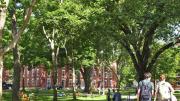In another indication that University officials are anticipating campus tension and protest this fall and hoping to avoid a repeat of last spring’s pro-Palestine encampment in the Yard, executive vice president Meredith Weenick emailed a message to the Harvard community Friday morning, reiterating the rules for the use of campus spaces. “We strongly embrace the right to freedom of thought, open inquiry, and free expression, including the right to protest and dissent,” Weenick wrote. But, she added, “This right is not limitless—it may not be exercised in a manner that obstructs the ability of other members of the Harvard community to engage in the activities that sustain our mission.” Echoing President Alan M. Garber’s Thursday message, Weenick pointed to the Statement of Rights and Responsibilities released in January by Garber and Harvard’s deans, which clarified University policy regarding protest on campus grounds. She also cited the University’s rules governing campus use, which, she wrote, “protect the right of all members of our community to teach, learn, research, work, and live on our campus.”
Weenick emphasized a few of those rules in particular, writing:
- Community members must produce a Harvard ID when asked by Harvard administrators or the Harvard University Police Department.
- If activities are in violation of Harvard’s policies or rules, participants will be asked to cease or adjust actions. Campus administrators will work with community members, as appropriate, to find another time, place, or manner for the desired activity or expression in accordance with Current Procedures for Permitting of Campus Protest Activity.
- Continued engagement in an activity that is disruptive or otherwise violates Harvard’s policies or rules may be captured digitally, and participants should be prepared to be held accountable for their actions, including by referral to appropriate school-based disciplinary processes.
- Where there is substantial disruption of the normal operations of our campus, University police may remove or remediate the disruption.
“Members of our community should expect that activities that violate Campus Use Rules, time place and manner restrictions, and other University policies will be addressed promptly,” Weenick wrote.
Students have been returning to campus all week, and Wednesday was move-in day for College first-years. Fall semester classes begin on Tuesday.









